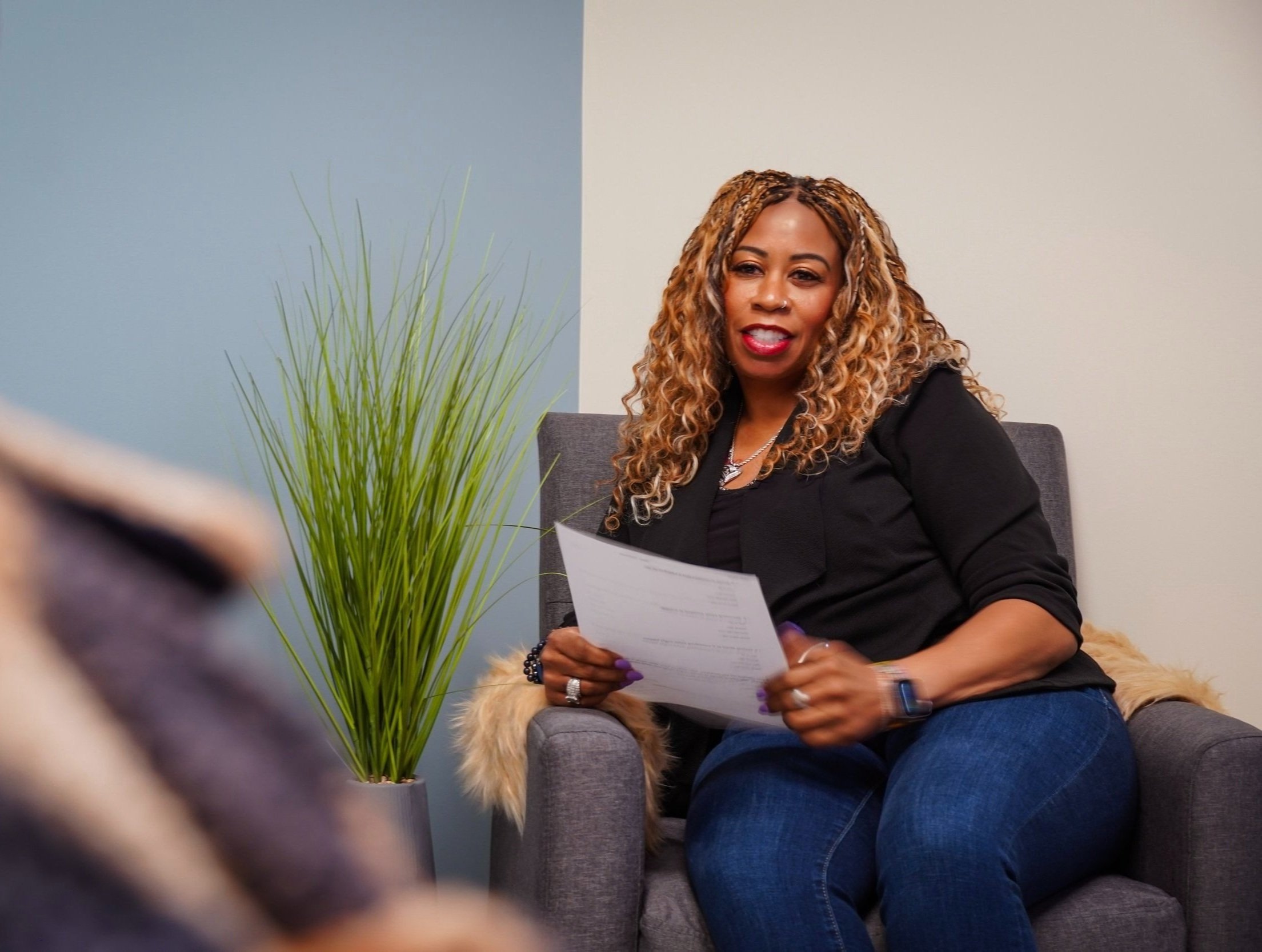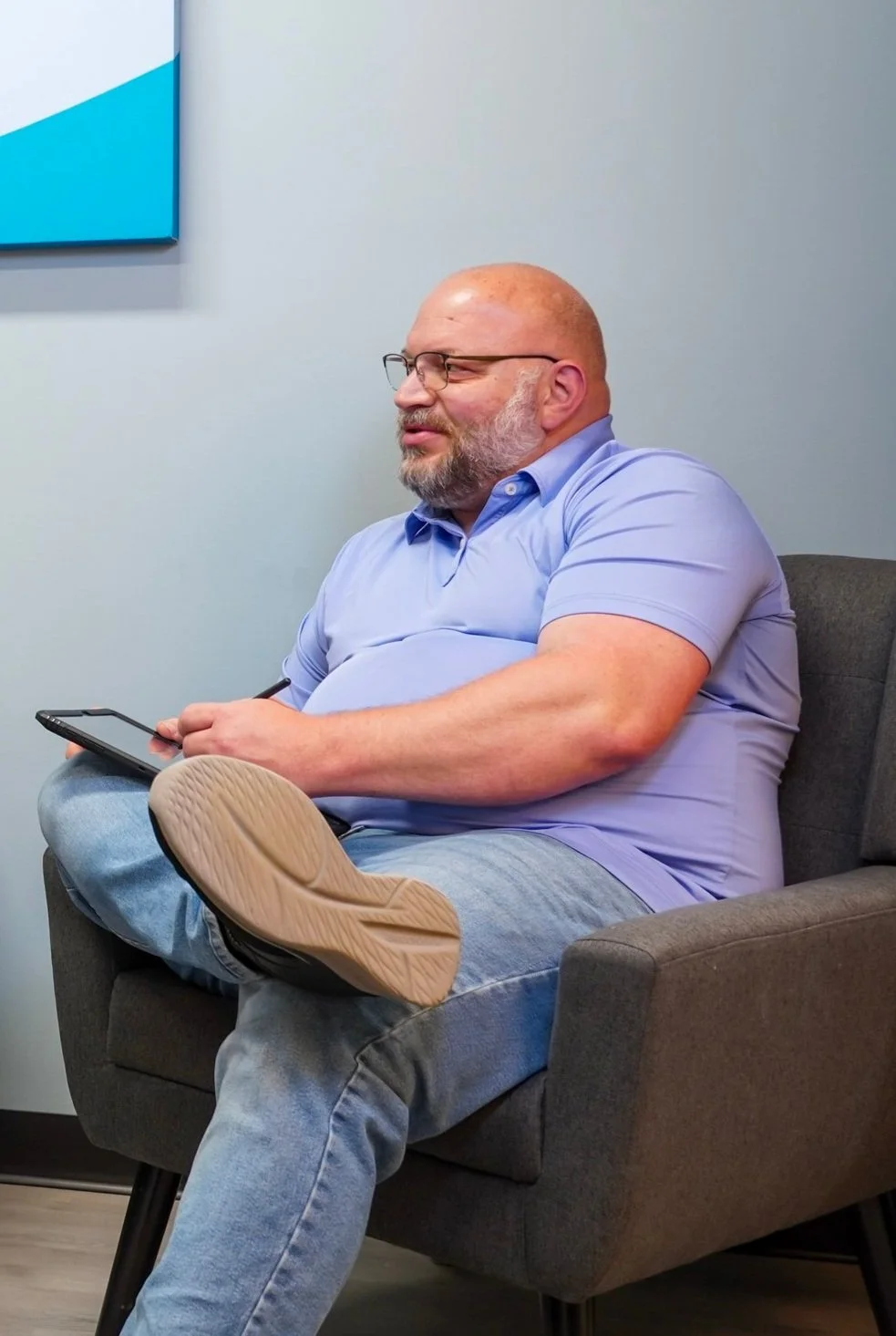
Brownsburg Counseling & Therapy
What We Do

What is counseling anyway?
To us, counseling is about getting to know yourself in new ways, so you can live more true to who you really are. It’s a space for you to slow down, reflect, and get honest about what’s really going on beneath the surface of the dissatisfaction, the anxiety, the stress, the numbness, or whatever you’re carrying.
Most people come to counseling thinking the problem is “out there.” And while that may be true, what’s happening inside shapes everything else: your relationships, your patterns, your stuckness, and your choices. Having a skilled partner to explore the deeper layers of your experience is how you find clarity—and when you start to see shifts.
The counseling process offers insight, tools, and perspective—but most of all, it offers a path to discovering (or rediscovering) who you are, underneath the struggle and discontent.

Therapeutic Approaches
Here are some of the therapeutic approaches we are skilled in.
-
The ways we relate to ourselves and each other don't appear out of nowhere. They were shaped — moment by moment — by our early environments. Rooted in Pia Mellody’s developmental framework, Developmental and Relational Trauma uncovers the patterns formed in our childhood and teenage years around boundaries, self-worth, needs, judgment, control, and attachment. These patterns show up in our relationships, emotional responses, and daily choices. Unraveling where they began can bring great clarity and empowers us to break free from old, limiting behaviors and create healthier ways of relating.
-
There’s a reason certain situations light you up, or shut you down. Interpersonal neurobiology gives language to the invisible forces behind your reactions: how your brain, body, and relationships have wired themselves to protect you. This approach blends neuroscience and attachment theory to help you understand the dynamic between your logic and emotion–your left and right brain–and how that balance (or imbalance) affects your life today. When you understand how you were shaped on a neurological level, you can begin to rewire what’s no longer serving who you want to be. You learn to respond more skillfully to situations — not just react — and over time, that changes how you show up in the world, in your relationships, and in yourself.
-
Nobody wants to be pushed into making a change. But how about discovering a change you actually want to make for yourself? Motivational Interviewing meets you exactly where you are: in the uncertainty, in the stuckness, in the part of you that wants something different but isn’t quite sure what or how or why. We create space for people to get honest about what they value, what holds them back, and what makes change feel hard. We walk alongside them — not directing, not prescribing — but listening closely, asking the right questions, and helping them hear themselves more clearly. Often, that’s where momentum begins.
-
The past doesn’t just stay in the past — it lives in your body, your beliefs, and the way you move through the world. But those old patterns can be repatterned in more healthy ways. EMDR taps into your brain’s natural ability to rewire itself, focusing on creating new, affirming neural pathways. This approach invites the brain to shift toward confidence, clarity, and self-assurance. Through structured eye movements or bilateral stimulation, EMDR helps you reframe old narratives, dissolve limiting beliefs, and build a more empowering way of being. It's a path to a stronger, more resilient you — one where you can trust yourself to navigate life with calm, confidence, and choice.
-
Pain is part of life — but suffering often comes from fighting against it. ACT invites you to make space for your full experience, rather than getting lost in the struggle to avoid or control it. Through this approach, you learn how to notice your thoughts, name your feelings, and reconnect with your deepest values. It’s a practice of presence. Over time, ACT helps people take meaningful action in their lives, not because everything feels easy, but because it finally feels aligned.
-
When life knocks you down or you’re at a crossroads, sometimes what you need most is a helpful advocate and a simple, yet powerful, next step. Brief therapy doesn’t aim to dig through every layer — it starts with where you are, and helps you move forward. Whether it’s navigating heartbreak, grief, or a major life shift, this approach focuses on what’s possible now. We look at what’s already working, where you’ve found resilience before, and how to take small (or big) steps toward what you want next. It’s about learning to spot your own answers — and trusting you can build from them.
-
Children speak through play long before they have words for what they’re experiencing. Play Therapy meets them in their natural language — not only to understand their behavior, but to help them feel safe, seen, and supported in their growth. Rooted in the science of brain development and attachment, this approach supports emotional regulation, parent-child connection, and healing from stress or trauma. We also work closely with parents — because your calm, your presence, your self-awareness — all of it helps shape your child’s nervous system. It’s never too late to repair and get your child the support they need.
-
Psychodynamic therapy explores how unconscious thoughts and early life experiences shape your current behaviors and relationships. It uncovers the emotional patterns formed in childhood that may be influencing your reactions today. By gaining insight into these hidden drivers, you can begin to understand the underlying causes of your struggles, leading to greater self-awareness and emotional freedom. This approach helps you break free from repeating unhealthy patterns, fostering lasting change that you want for yourself.
-
Emotion-Focused Therapy centers on understanding and processing emotions, which are often at the heart of our challenges. It helps you identify and explore the feelings you may have learned to suppress or ignore. Through EFT, you can experience your emotions fully and transform your relationship with them, creating healthier emotional patterns. This approach is particularly helpful in deepening self-compassion, improving emotional regulation, and strengthening relationships to self and others.
-
Cognitive Behavioral Therapy focuses on the connection between your thoughts, feelings, and behaviors. It helps you recognize and challenge the negative thought patterns that contribute to emotional distress. By replacing unhelpful beliefs with healthier, more realistic ones, you can change how you feel and respond to situations. CBT is practical, goal-oriented, and particularly effective for those seeking immediate relief from stress, anxiety, and depression.
-
Guided meditation provides a space to slow down, reconnect with your body, and quiet the mind. Through focused breathing, visualization, and mindfulness techniques, this approach helps you cultivate a deeper sense of clarity of what you’re carrying and spaciousness for more choice. It’s a powerful tool for managing stress, enhancing emotional well-being, and building greater self-awareness. Guided meditation encourages presence and reflection, allowing you to navigate life more balanced and resilient.
-
Strengths-Based therapy shifts the focus from what’s wrong to what’s right. It centers on identifying your inherent strengths and resources, empowering you to build on them. This approach helps you develop a sense of self-efficacy and resilience by recognizing and utilizing the strengths you already possess. By cultivating a mindset rooted in possibility, you can overcome challenges with confidence and a renewed sense of purpose.
-
Life doesn’t come with a roadmap — and sometimes, that uncertainty can feel overwhelming. Existential therapy explores the deeper questions beneath your struggles: Who am I? What matters to me? How do I live with freedom, responsibility, and meaning? Rather than aiming to “fix” symptoms, this approach invites reflection on how you relate to life’s inevitable challenges — like loss, change, and the unknown. In that process, you begin to uncover your own sense of purpose and what it means to live more fully, on your terms.

I’m passionate about the type of modalities that we offer because I know that they work! Not only have I experienced them for my own personal mental health journey, but seeing individuals heal from past trauma and struggles they have had in relationships, I know that they are useful. I have seen individuals on the brink of divorce heal their marriages. I have seen parents who feel terrible for the way they react to their children grow in their understanding of how to repair ruptures that happen.


